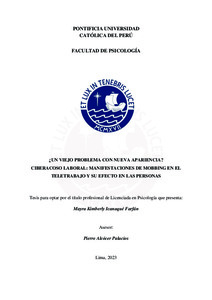| dc.contributor.advisor | Alcócer Palacios, Pierre | |
| dc.contributor.author | Icanaqué Farfán, Mayra Kimberly | |
| dc.date.accessioned | 2023-09-19T17:59:01Z | |
| dc.date.available | 2023-09-19T17:59:01Z | |
| dc.date.created | 2023 | |
| dc.date.issued | 2023-09-19 | |
| dc.identifier.uri | http://hdl.handle.net/20.500.12404/25995 | |
| dc.description.abstract | El presente estudio tuvo como propósito indagar las manifestaciones del ciberacoso
laboral y su efecto en las personas, a través del análisis de las experiencias de las víctimas de
este fenómeno. El método empleado para la investigación fue de tipo cualitativo con enfoque
de análisis temático. Se entrevistaron a ocho participantes de sexo femenino, residentes de
Lima que habían sido víctimas de ciberacoso laboral durante un periodo superior a 6 meses,
bajo la modalidad de teletrabajo. Los resultados estuvieron divididos en dos temas:
manifestaciones de ciberacoso laboral, y efectos producidos a causa del ciberacoso laboral. Los
hallazgos indican que el acoso laboral ha logrado migrar a la virtualidad, a través de sus
manifestaciones usuales, pero que, además, el nuevo contexto ha dado origen a nuevas formas
de violencia que se han desarrollado con la misma finalidad. Al respecto, se plantea la
necesidad de realizar más investigaciones similares, con diversas poblaciones, y condiciones,
en el contexto latinoamericano, de manera que sea posible visibilizar este tema que, pese a su
relevancia, ha sido tan poco explorado | es_ES |
| dc.description.abstract | The purpose of this study was to investigate the manifestations of cyberbullying at work
and its effect on people, through the analysis of the experiences of the victims of this
phenomenon. The method used was qualitative research with a thematic analysis approach.
Eight female participants, residents of Lima who had been victims of cyberbullying at work
for a period of more than 6 months, were interviewed under the modality of teleworking. The
results were divided into two themes: manifestations of cyberbullying at work, and effects
produced by cyberbullying at work. The findings indicate that workplace harassment has
managed to migrate to virtuality, through its usual manifestations, but that, in addition, the new
context has given rise to new forms of violence that have been developed with the same
purpose. There is a need to carry out more similar research, with different populations and
conditions, in the Latin American context so that it is possible to make this issue visible, which,
despite its relevance, has been so little explored. | es_ES |
| dc.language.iso | spa | es_ES |
| dc.publisher | Pontificia Universidad Católica del Perú | es_ES |
| dc.rights | info:eu-repo/semantics/openAccess | es_ES |
| dc.rights.uri | http://creativecommons.org/licenses/by/2.5/pe/ | * |
| dc.subject | Teletrabajo--Perú--Lima | es_ES |
| dc.subject | Violencia en el trabajo--Efectos psicológicos | es_ES |
| dc.subject | Discriminación sexual en el trabajo | es_ES |
| dc.subject | Mujeres--Empleo | es_ES |
| dc.title | ¿Un viejo problema con nueva apariencia? ciberacoso laboral: manifestaciones de mobbing en el teletrabajo y su efecto en las personas | es_ES |
| dc.type | info:eu-repo/semantics/bachelorThesis | es_ES |
| thesis.degree.name | Licenciado en Psicología | es_ES |
| thesis.degree.level | Título Profesional | es_ES |
| thesis.degree.grantor | Pontificia Universidad Católica del Perú. Facultad de Psicología | es_ES |
| thesis.degree.discipline | Psicología | es_ES |
| renati.advisor.dni | 42292220 | |
| renati.advisor.orcid | https://orcid.org/0000-0001-5325-001X | es_ES |
| renati.author.dni | 72838991 | |
| renati.discipline | 313016 | es_ES |
| renati.juror | Rasmussen Lujan, Gian Harry's | es_ES |
| renati.juror | Donayre Hernandez, Carmen Rosa | es_ES |
| renati.juror | Borja Chavez, Jorge Diego Augusto | es_ES |
| renati.level | https://purl.org/pe-repo/renati/level#tituloProfesional | es_ES |
| renati.type | https://purl.org/pe-repo/renati/type#tesis | es_ES |
| dc.publisher.country | PE | es_ES |
| dc.subject.ocde | https://purl.org/pe-repo/ocde/ford#5.01.00 | es_ES |







